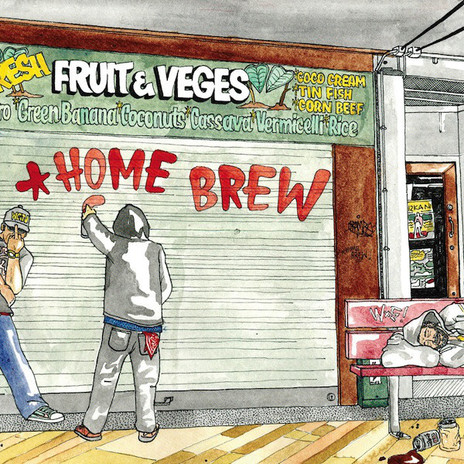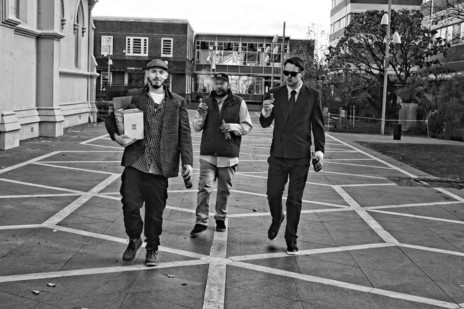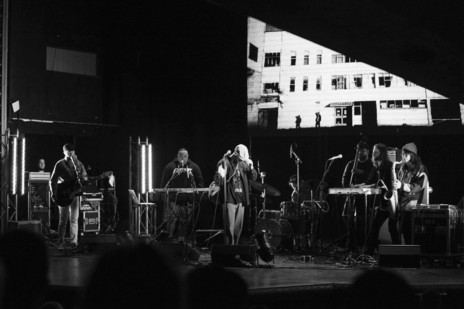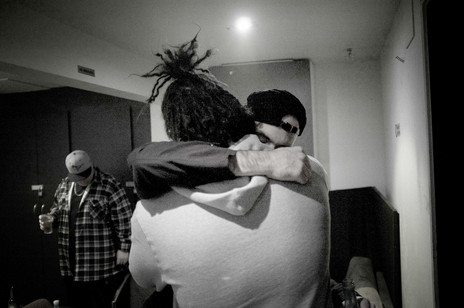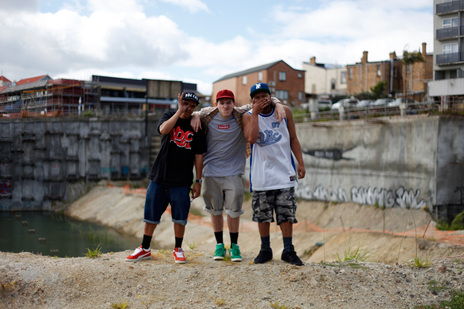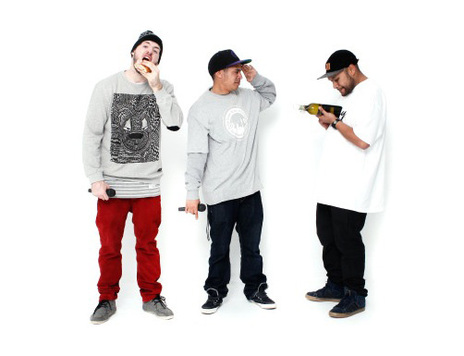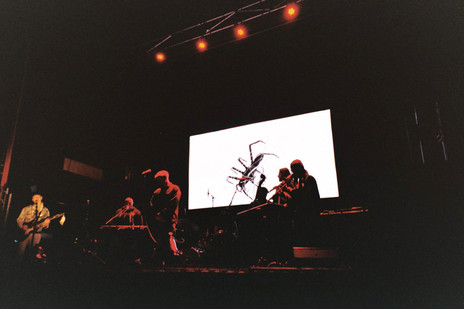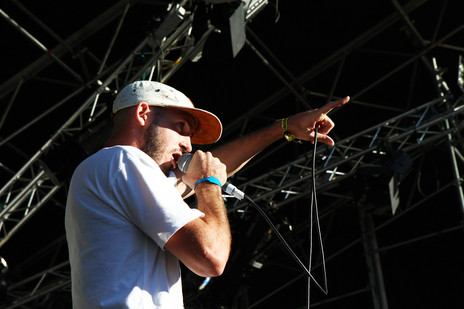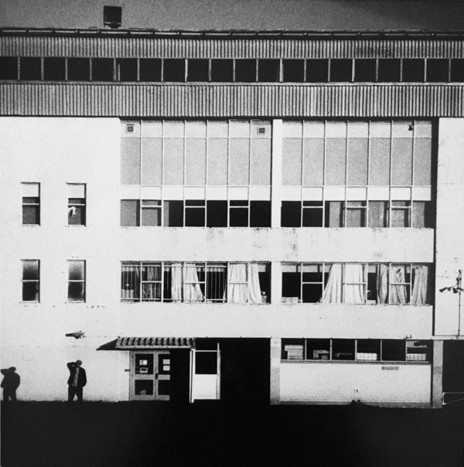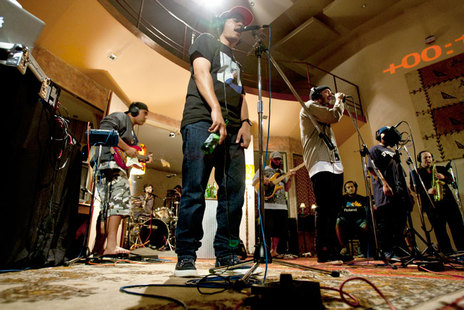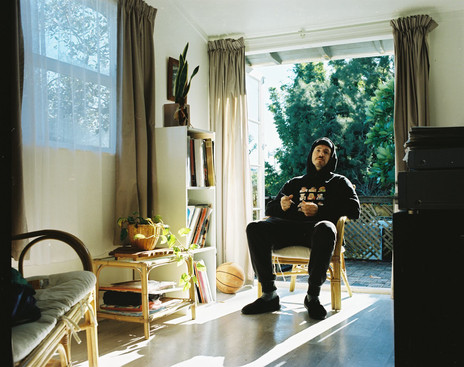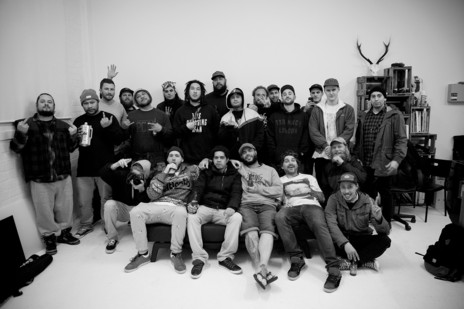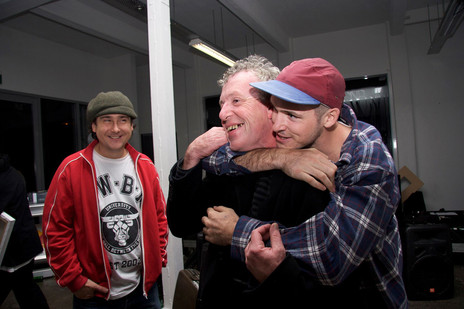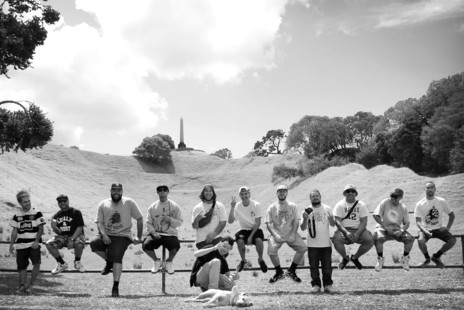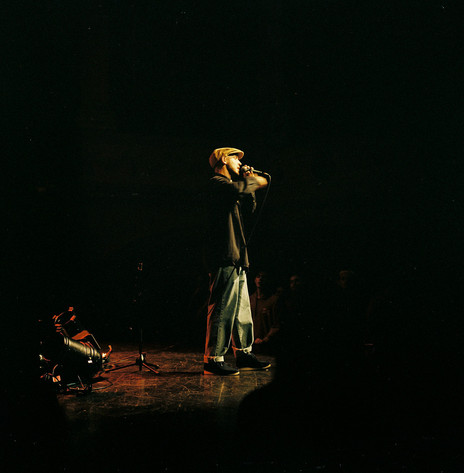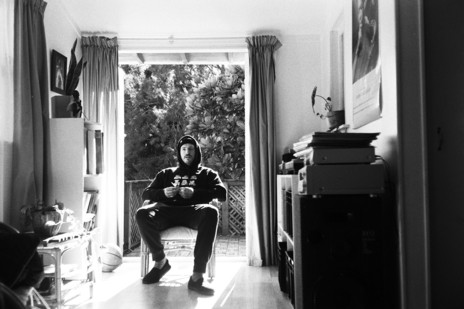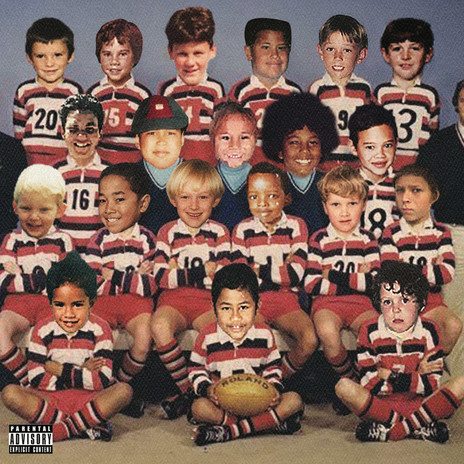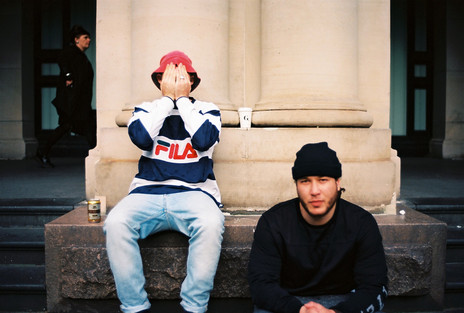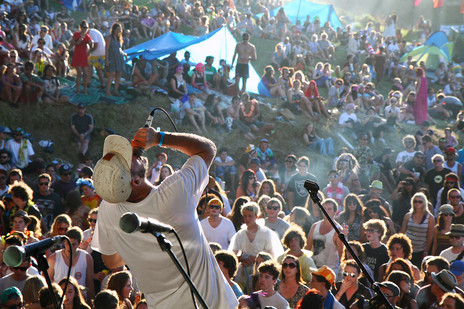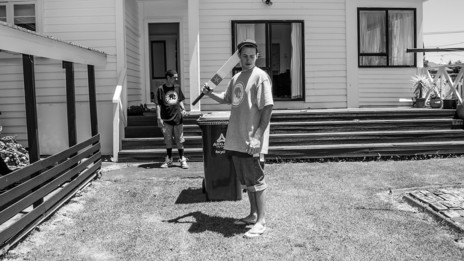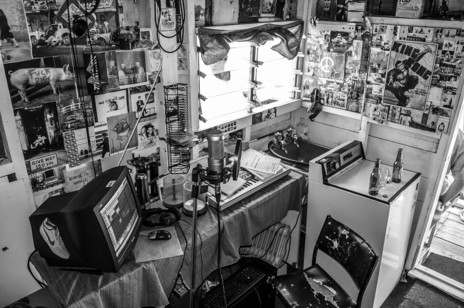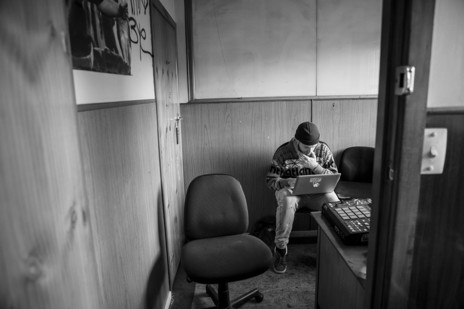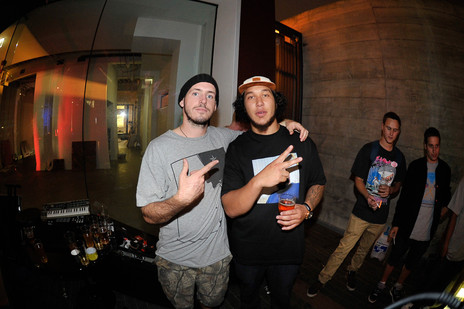When he was 10, he started rapping, just for the fun of it. “I never saw this as a career, I just liked doing it, I did it in the sleepout.”
Initially, though, Scott did try to get something happening with music in the suburb he grew up in. “I guess it started in Avondale with me and Shaun Hopkins [SoulChef]. We would drop CDs in people’s letterboxes. One of my first ever gigs was at this b-boy event at Youth Town called Raw Styles.”
Nothing much came from it and Scott instead decided to go to Dunedin where he studied neuroscience. Despite trying to get away from music, rap was never far from his mind. “I was trying to give it up. I wanted to be a neuroscientist, I went down there and I was writing rhymes in my dorm and every week I would go to Real Groovy and spend my course-related costs.”
After getting kicked out of his hostel, Scott returned to Auckland and he decided to give rap another go. It was here where the seeds of Home Brew were sewn. The group formed after Scott met a producer by the name of Haz Beats (Haz Huavi) online. The two struck up a relationship before they had even met. “I began sending him music through the internet,” Haz Beats explains, “and It wasn’t till like a month later when I started listening that I was like, wow, this guy’s actually got content that I want to listen to.” They were then joined by Scott’s childhood friend Lui “Lui Silk” Gamaka.
Over the next few years, Home Brew established a large following in the local rap scene, releasing four projects independently on Bandcamp as pay-what-you-want downloads, while at the same time creating both their music videos and promoting themselves in-house.
Home Brew’s impact on New Zealand rap was significant due to the subject matter of their material as well as how they operated as a group, particularly with their strong DIY aesthetic which is now the norm within the local rap scene.
Home Brew was a central part of the sea change taking place in New Zealand hip hop in the mid-2000s.
In many ways, a sea change was taking place in New Zealand hip hop in the mid-2000s and Home Brew was very much at the centre of it. “I just wanted to write about average, normal New Zealand stuff,” says Scott, “because the culture that my generation of hip-hop is from is about ‘keep it real’. You’d get called out if you were claiming to be someone you weren’t, so I was trying to be myself as much as possible.”
Haz Beats agrees. “Everyone at that time was still Americanised and no one was talking about everyday topics in New Zealand. Tom was writing about stuff like being on the benefit or being broke, and I think that’s what people related to.”
Initially, mainstream success eluded Home Brew and they mostly operated outside the strict structures of the music industry – often without financial support, which led to some interesting promotional strategies. “Tom got us to post the songs up on social media,” says Haz Beats, “it was us doing promo without even knowing it. It was on Bebo, it was on MySpace, it was on hiphopnz.com, and the rest was just word of mouth.” In 2010 the group even raised $15,000 from fans to fund a music video for their single ‘Under the Shade’, after being overlooked for NZ On Air funding.
When success finally came it was with their self-titled debut album, released in 2012. Featuring the likes of Hollie Smith and Tourettes, the Home Brew double album was socially and politically charged and dealt strongly with themes such as drug abuse, alcoholism and being a beneficiary.
The album went to No.1 in the country on the back of a 48-hour release party at Shooters Saloon Bar in Auckland where every attendee received a copy of the album. The achievement of reaching No.1 was monumental in rap terms as it hadn't happened to a New Zealand hip hop artist since Scribe in 2003. Given the group’s outlaw reputation, Scott saw the humour in the accolade. "I've always tried so hard to make the industry hate us and now we're number one – I guess I even failed at that.”
The album earned the group four New Zealand Music Awards nominations including best album. They won best rap album at the 2012 ceremony and famously turned up to the awards with a goat. During an acceptance speech, Scott called out then Prime Minister John Key for not doing enough to help the working class, before being cut off. Home Brew always had a love-hate relationship with the music industry and it was perhaps most evident that night.
In 2012 Home Brew famously turned up to the NZ Music Awards with a goat.
While Home Brew was basking in the glow of a No.1 award-winning album, Scott began exploring other projects and further opportunities for collaboration. He had already worked with Dubious Bros beat-maker Chris Macro on the Max Marx and Friedrich Calloway at Carnegie Hall project in 2010, and by 2011 had two new projects in the works.
The first of these was @Peace, a more jazz-influenced and experimental group that also included Lui Tuiasau, Christoph El’ Truento, Hayden Dicky, and Brandon Haru. @Peace was a conscious effort by Scott to go deeper musically. “I wanted it to be something you had to think more about and we tried so hard to make something that people couldn’t digest.”
@Peace released its self-titled debut in 2011, and two more followed: Girl Songs in 2013, and the critically acclaimed @Peace and the Plutonian Noise Symphony in 2014. All three of the group’s albums were nominated for the Taite Music Prize.
Scott’s time in @Peace was not without controversy though. In 2014 the group released the politically-charged ‘Kill The PM’, a song which created a media storm in the lead-up to the general election and led to a police investigation. Many deemed the song a threat to PM Key and his family.
At the time, Scott defended the song, saying it was a call to get more people enrolled to vote. “130,000 eligible people under 25 have not yet enrolled. What is important is that we enrol to vote so that we have a chance to select someone to represent us who understands the concept of empathy.”
After the media fallout as a result of ‘Kill The PM’ – a fallout which included Scott walking out of an interview with Kim Hill on Radio New Zealand – @Peace called it quits in early 2015. In a post on their Facebook page, the group said “we spent the last three projects talking about how everything eventually ends. You know how it is. Time to euthanise the group.”
Around the time @Peace began, Scott also helped to start Young, Gifted & Broke, a collective of artists, musicians, and other creative people that included Raiza Biza, Louie Knuxx, and Team Dynamite. Scott called it “a collection of artists too broke to pay the rent but too proud to sell out.”
Over the next few years YGB hosted many showcases that included the various musicians involved and produced new releases of some of the most exciting R&B and hip-hop artists in New Zealand. In the process, YGB helped set a new blueprint for collaboration which many in the rap scene still draw on today. Young, Gifted & Broke ended in 2018.
In 2013 Scott moved to Melbourne looking to broaden his musical horizons and look for further opportunities. “There is only so much you can do before you have outgrown the fishbowl. So I had to jump and I went looking for something over there.”
In Melbourne, he was joined by fellow @Peace member Lui Tuiasau and it was here where Average Rap Band was formed. This new project was very much influenced by 1980s synth music and led to two projects being released on Bandcamp, 2015’s Stream Of Nonsenseness and 2016’s El Sol.
With Average Rap Band, Scott was again looking to try new things stylistically. “Our mission with this new project was to make something that made you feel good.” Scott even described the project as being “anti-avant-garde” and in some ways a reaction to the final @Peace album.
Scott spent a few years in Melbourne before moving back to his home suburb of Avondale; his partner was pregnant and they wanted to raise their son in the suburb he grew up in. However, there was also another reason for leaving Australia. Scott had new music on the way and he needed the right environment to put these musical ideas into practice.
Scott describes the ‘Avantdale Bowling Club’ album as “a self-help book addressed to myself.”
This was the beginning of Avantdale Bowling Club, an album that would become his most personal and challenging. The album was an account of the last few years of his life, becoming a father and coming to grips with adulthood. Topics and themes such as depression, drug abuse, inequality, and his home suburb of Avondale all feature on an album Scott says was about growing up. “It is about dealing with your own stuff for once. Accepting responsibility. It’s a self-help book addressed to myself.” Scott even called Avantdale Bowling Club a grown-up version of the Home Brew disc; it saw him move stylistically again, this time into the jazz-rap field he had flirted with in the past.
The Avantdale Bowling Club album was four years in the making, with Scott beginning to write while he was in Melbourne. “I was in a city full of people I didn’t know, and that intimidated me. I just locked myself in my room, and I would look out onto Smith Street and write about that, and that’s how songs like ‘Home’ came to be. When I started writing it, I had just left home, left all my friends, left my status and my ego and I was pretty lonely. I was probably depressed and music was my way of dealing with what was going on.”
Once back in New Zealand the creative process for the album really took off, with Scott drawing on the likes of Julien Dyne, Jeremy Toy, Guy Harrison and others to craft the album he described as being like making psychological warfare. Tracks began as simple loops in his home studio, before he brought in the musicians to put his ideas into practice, while other people would also send him beats, to which he would then write lyrics.
The album was met with critical acclaim locally; many regarded it as his best album yet. It reached No.2 in the album charts and, in 2018, saw him win the Taite Music Prize (on his fourth attempt). The first single and opening track of the album ‘Years Gone By’, an autobiographical look back on his life year by year, earned Scott an APRA Silver Scroll nomination.
Scott remains keen to continue with the Avantdale Bowling Club project but it is not the only thing happening in his life. He continues to tour with Home Brew, often playing music festivals around New Zealand. In 2018, Home Brew undertook what they described as “the fundraising tour”: a tour to help raise money to buy back the rights to their self-titled record, which they lost after getting entangled in legal issues with their distributor Frequency Media Group.
Outside of touring with his old group, Scott remains busy working on other musical projects. He says a new Average Rap Band album is also on the way. “We have an album which is just a whole bunch of love songs. I am trying to convince Lui [Tuiasau] it is worth finishing.” Scott has also launched a record label, YGB Records.
Scott is quite content with what he has achieved. “I got nothing to be bitter about. I’m pretty happy where I am.” The trick is finding the right balance between family and making music. “It gives you cognitive dissonance. One day you are at home trying to be a good family man and the next day you are on tour trying to be a good entertainer. I have got to be able to wear two hats.I am trying to find a way to hold my family down, be a good father, be a good partner, and still be creative. It is hard and that is the challenge I am facing at the moment.”
In November 2019 Tom Scott won the album of the year award at the Vodafone NZ Music Awards for the Avantdale Bowling Club album.
